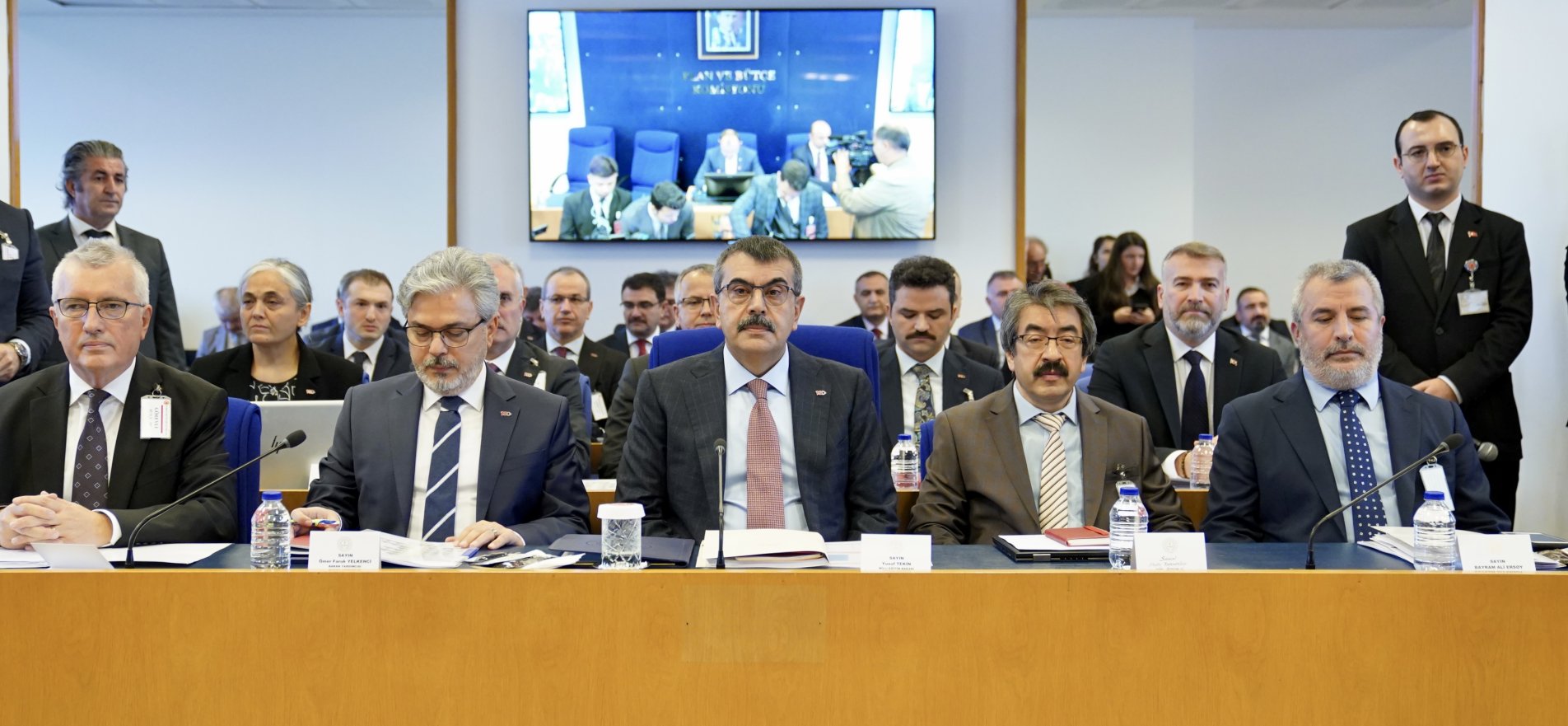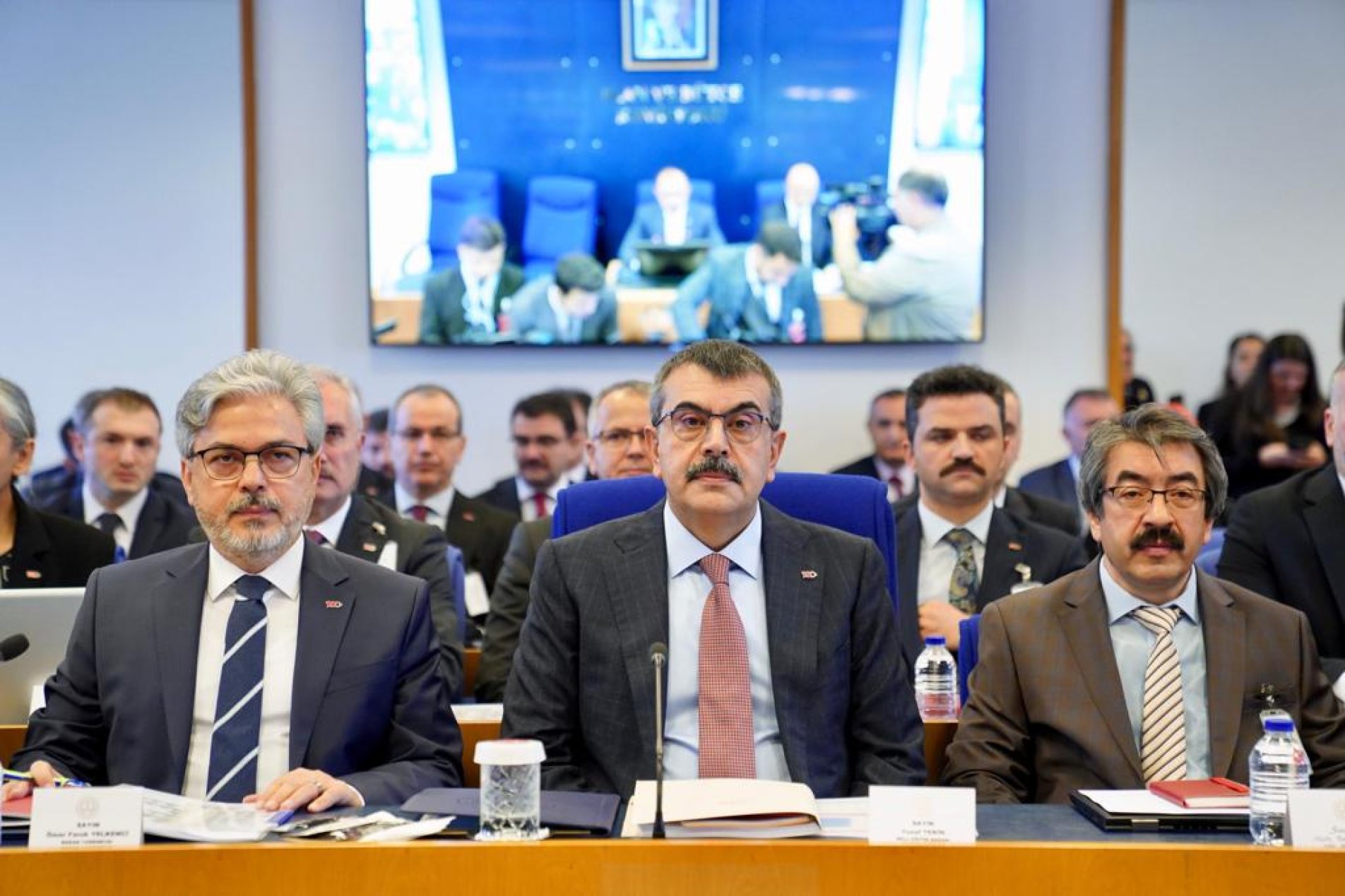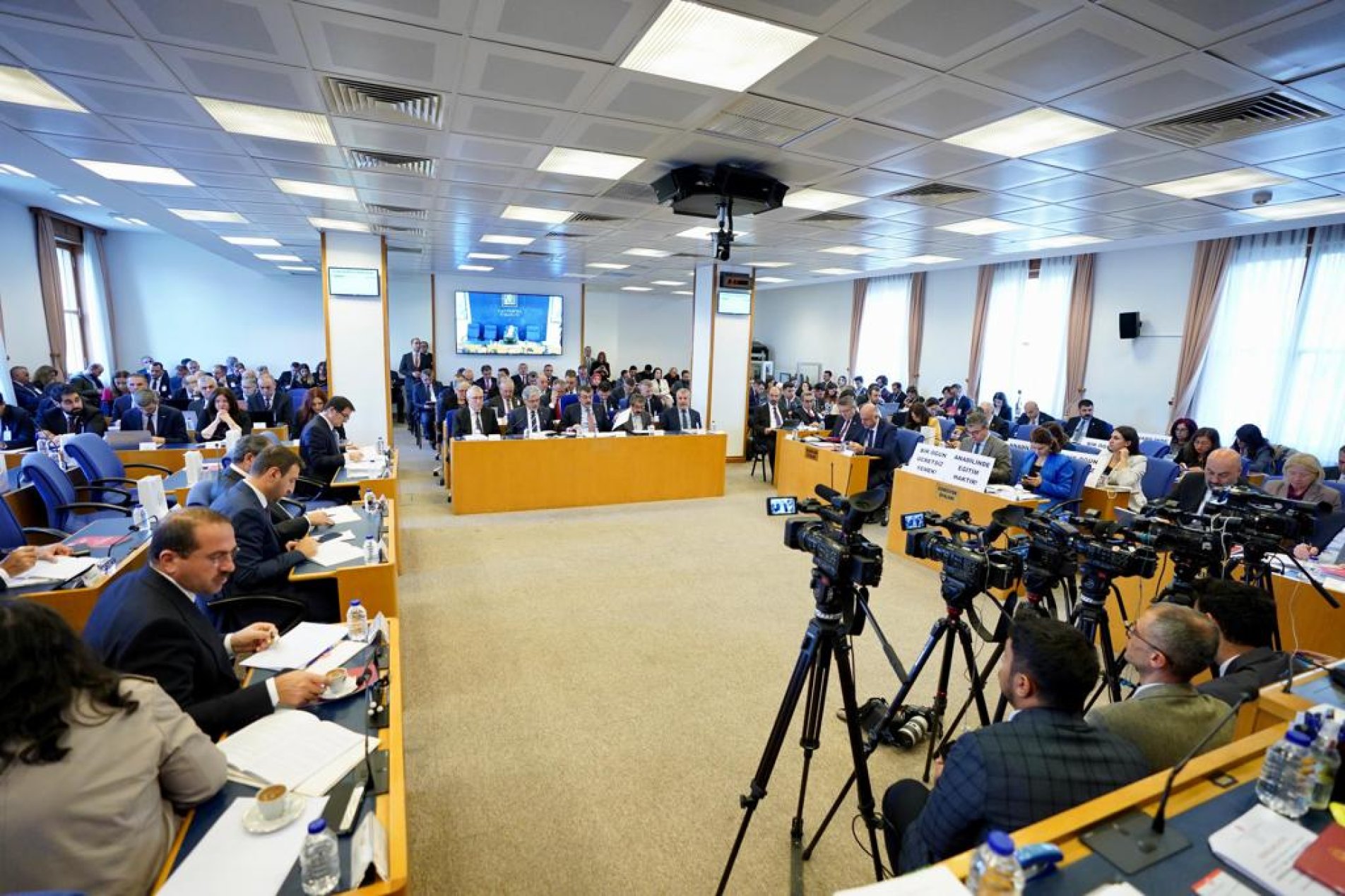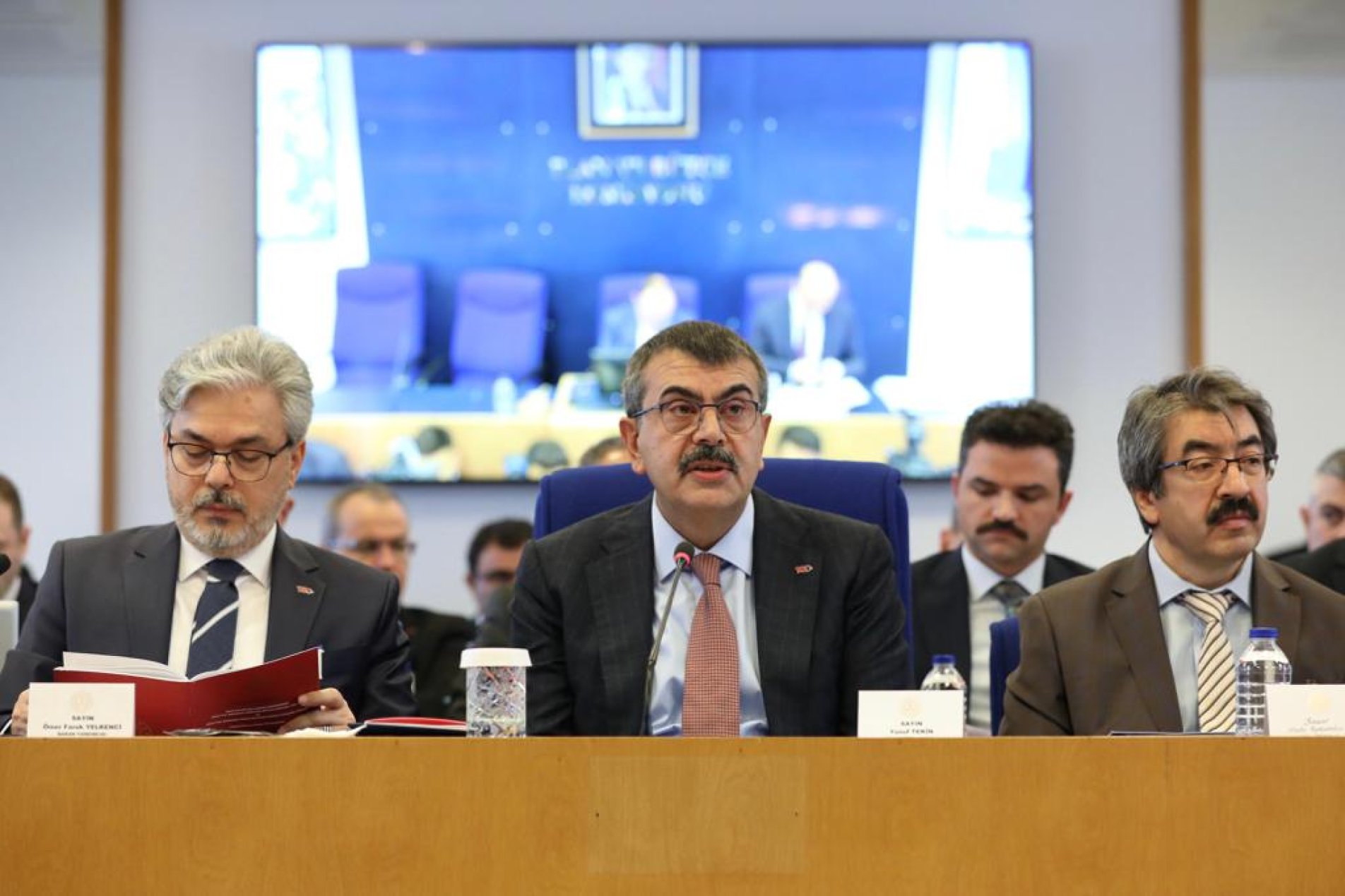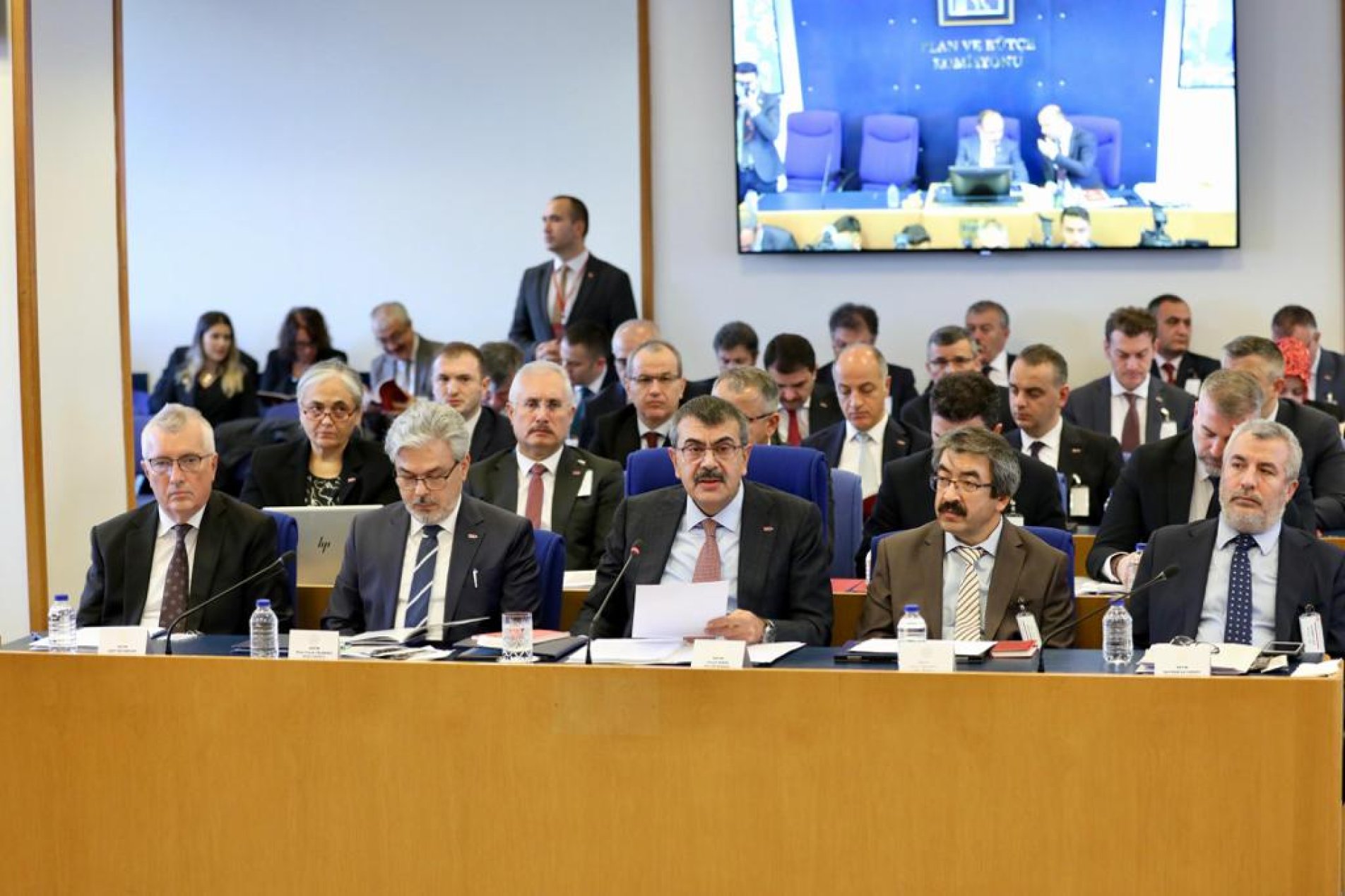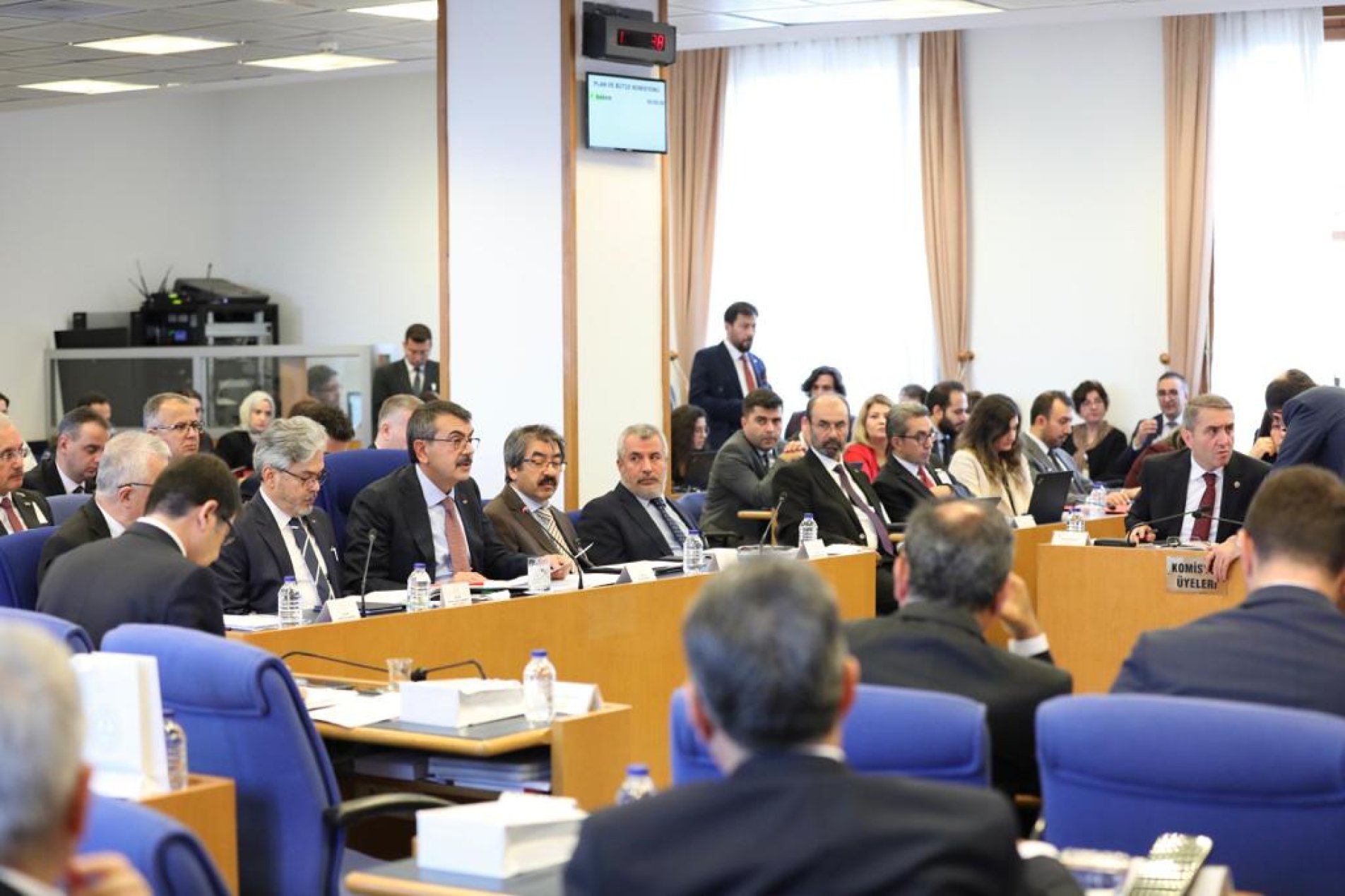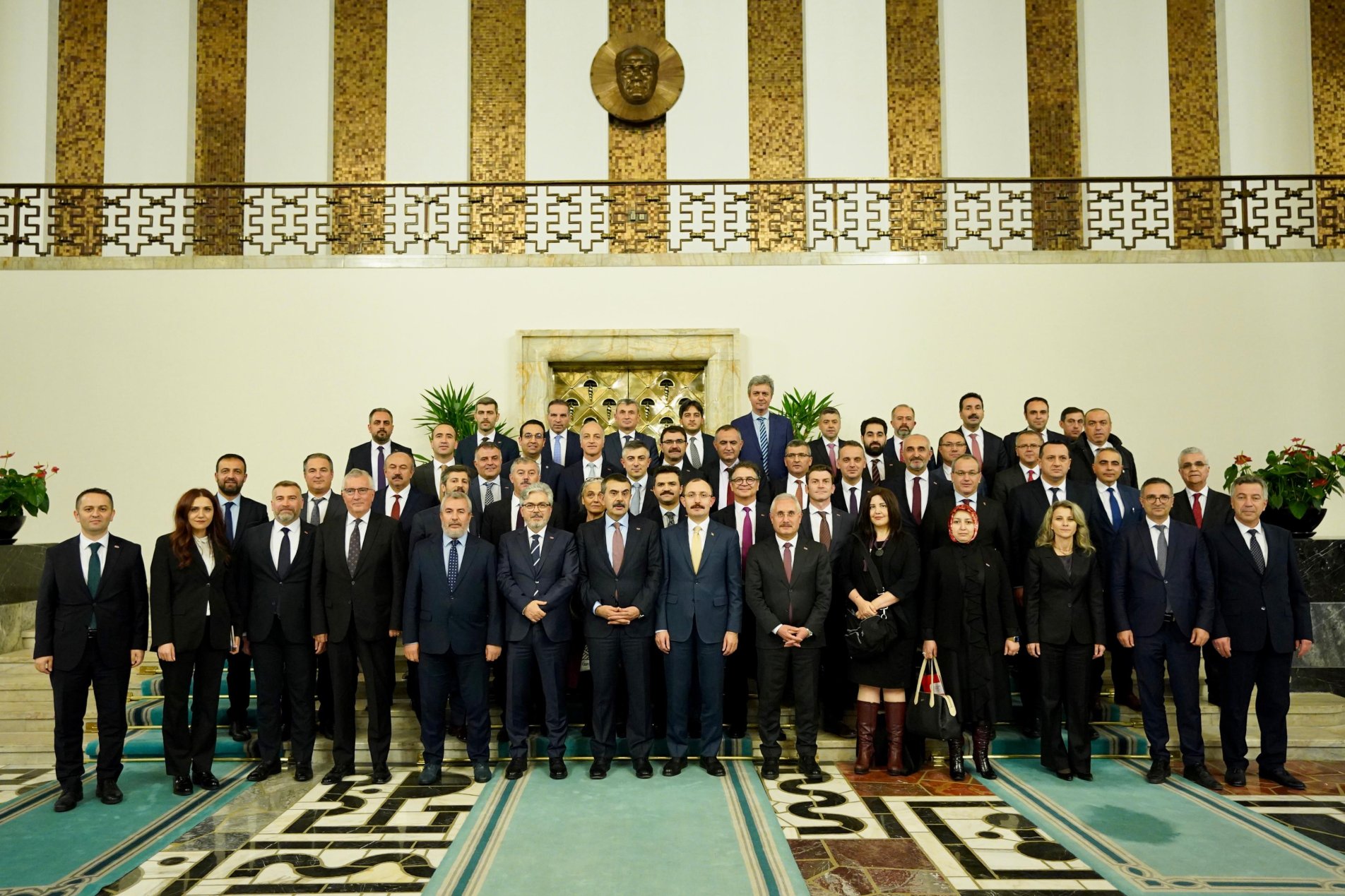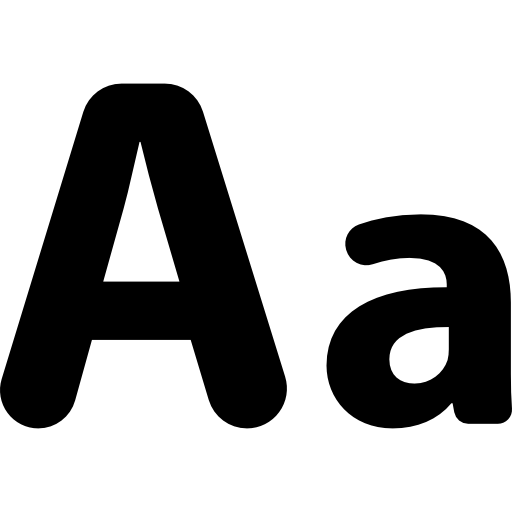Making a presentation regarding the 2024 budget of his Ministry at the Grand National Assembly of Türkiye Planning and Budget Commission, Minister Tekin celebrated the 100th anniversary of the Republic.
Commemorating the Founder of the Republic Gazi Mustafa Kemal Atatürk, with respect on the 85th anniversary of his death, Tekin touched upon the statement of Atatürk: "If I were not the President, I would be the Minister of National Education." The Minister emphasized that they will continue to work with all their strength, with the awareness of carrying a responsibility that he exalted with his statement.
Pointing out that there is a very strong link between education and development and ensuring national unity and solidarity, Minister Tekin said the education level of people increases at the same rate as the political, social and economic development of the country.
Underlining that they structured the education system at the dawn of a more prosperous Türkiye in the Century of the Republic as a liberation process that includes the conditions of knowing oneself and being a good human being, Minister stated that they are trying to create a new systematic based on the culture, art and technology-oriented development of strong individuals who understand the world on the axis of civilization values. He emphasized that the education system, which is of vital importance for Türkiye to be able to define its ideal in the future as it is today, is of critical importance for the realization of the ideal of the Century of Türkiye, which they believe will be the new era of education. Minister Tekin said that it is time to build an education system based on consultation and national awareness on this infrastructure that has been largely completed in the last 20 years.
Minister Tekin stated that the education model of this country will position itself on a philosophy that is both compatible with and develops the universal nature of human beings and will be shaped with a national content that carries the basic characteristics of the history, tradition and civilization to which Türkiye belongs. Adding that only in this way they will reach the desired goal in education and focus on the development of young people and be able to meet their pedagogical needs, Minister Tekin stressed that this goal is a requirement of the ancient civilization vision they follow.
Noting that they aim to create a system where everyone has access to quality education at all levels of education and training, starting from early childhood education, the Minister emphasized that they shaped their education policies in this direction.
Tekin stated that the Republic, which was founded a hundred years ago with limited resources, consists of more than 19 million students, more than 1 million teachers, more than 74 thousand educational institutions, and a population of approximately 21 million.
"The largest share in the budget was allocated to education"
Stating that the largest share in the 2024 Central Government Budget Law is allocated to education this year, Minister Tekin said The Ministry of National Education (MEB), the Council of Higher Education (YÖK), the Center for Assessment, Selection and Placement (ÖSYM) are responsible for carrying out formal and non-formal education services covering all segments of the society. He explained that the education budget was determined as 1 trillion 619 billion 907 million 408 thousand lira, together with the resources allocated to the ÖSYM, Higher Education Quality Council (YÖKAK), universities and other Ministries.
Underlining that this figure constitutes 14.6 percent of the 2024 Central Government Budget, Tekin stated the budget of the Ministry of National Education, which was 4 billion 955 million dollars in 2002, was increased to 16 billion 215 million dollars in 2023 and to 38 billion 294 million dollars in 2024.
In his presentation, he gave information about legislative changes including issues such as combating obesity and digital addiction, promotion of physical activity, student attendance-absence, grade repetition, assessment and evaluation and the introduction of an appointment system for meeting with teachers.
Intervention commissions will be established
Stating that they continue to work on institutional capacity building and awareness raising regarding students at risk of absenteeism and school dropout, the Minister shared that they decided to establish prevention intervention commissions in schools in this context.
Noting that they are working on developing an integrated prevention, intervention and compensation model consisting of educational activities in school and out of school such as visual arts, music, drama, performing arts, workshops, make-up, training classes and mentoring services for students, Tekin stated that they reached out to all young people one by one and enabled them to benefit from schooling options.
Stating that they aim to make it sustainable for all children in the education age population to access education, Tekin mentioned they have developed an early warning system that uses multiple data points for early detection of risk.
"We make the changes in the curriculum through this motivation."
Expressing that they want to provide students with the basic competencies, intellectual foundations and social values required by the age, Minister Tekin said that, as the Ministry, they made the changes in the curriculum with this motivation and aim to provide the students with an interrelated context. Emphasizing that they strive to create a multidimensional understanding that will enable students to approach events just like the problems they encounter in real life, Minister Tekin said they constantly improve and update the programs implemented in formal and non-formal education institutions affiliated to the Ministry, in line with the changes and developments in the subject area, the needs and expectations of the individual and society, and the Framework for K-12 Integration Model of Türkiye.
Noting that they constantly follow the areas where changes occur and reflect the necessary studies in course schedules and curriculum, Tekin, the elective courses section in the weekly course schedules applied at primary and secondary education levels, will be implemented in the 2023-2024 academic year in order to ensure that students not only acquire the necessary academic skills but also to be trained in line with their abilities, to prepare the ground for their development in the areas they are interested in and to provide them with national, spiritual and ethical values.
Explaining that they have developed teaching programs for the elective courses provided within the scope of the weekly course schedules, Tekin said that by taking into account the needs of the age and the developing technology, the elective course group at both primary and secondary education levels will be taught as a whole, "human, society and science", "religion, morality and values". He stated that they updated the project under three headings: "culture, art and sports".
"We must rebuild our values by blending them with a universal perspective"
Pointing out that they have offered 16 elective courses at the primary education level and 18 elective courses at the secondary education level to be taught as of the 2023-2024 academic year, Minister added that they aim to develop the understanding of social responsibility and community service with the "social responsibility program" Minister announced they introduced at least 40 hours of social service obligation during the secondary education period as part of the program.
Pointing out that the transfer of civilization to generations can only be achieved by protecting, developing and strengthening the language, Tekin said that their primary duty as educators is to protect Turkish with the awareness of national culture. Stating that they should rebuild local and national cultural values by blending them with a universal perspective, Minister Tekin underlined that in this fast-paced age where technological developments, transformations and digitalization affect every aspect of life, their first duty is to preserve Turkish with all its originality.
Minister Tekin explained that, as the Ministry, they carried out comprehensive activities in many areas to eliminate the damage of the February 6 earthquakes.
Stating that they have completed the work of all educational buildings that need repair, Tekin said that in this context, they have made approximately 45 thousand classrooms in the earthquake zone ready for the 2023-2024 school year.
"Significant progress has been made in many areas of higher education"
Stating that significant progress has been made in many areas, especially access to higher education, with the quantitative growth in higher education in recent years, Minister Tekin said that as of the 2022-2023 school year, 8.3 million students are studying in 207 higher education institutions, 129 public and 78 private. Minister Tekin shared that the number of teachers which was 20 thousand 333 in 1984, increased to 184 thousand 702 in 2022.
Stating that there are 93 thousand 813 faculty members according to 2022 data, Minister Tekin shared the data that 45.78 percent of the faculty members are women, 54.22 percent are men, and one third of the professors are women. Noting that the number of female faculty members increased from 37 percent in 2003 to 46 percent, and the number of female research assistants increased from 42 percent to 53 percent, Tekin highlighted that this increase will also enable the number of faculty members in the higher education system to rise.
Tekin expressed that they enable regions to acquire regional development-oriented missions in line with the projects they prepare and present with their own dynamics.
Stating that 11 pilot universities were determined by YÖK in the first stage with the Sustainable and Environmentally Friendly Campus Application, Tekin stressed the aim is for the universities to have campuses that are sustainable, energy efficient, nature-friendly, have zero waste and minimum impact on the environment.
Explaining that undergraduate and graduate programs in the field of artificial intelligence have been opened in many universities in the last two years, Minister Tekin reminded that the Institute for Data Science and Artificial Intelligence was established for the first time within Boğaziçi University. Minister Tekin said that within the scope of the project carried out through the Digital Transformation Office of the Presidency, students have started to be admitted to cyber security vocational schools established in 4 universities as of 2023.
Noting that the Higher Education Quality Council (YÖKAK) has already completed the institutional external evaluation of 189 higher education institutions as of 2023, carried out monitoring activities for 145 higher education institutions and accredited 53 higher education institutions within the scope of the Institutional Accreditation Program, Minister added that all our higher education institutions will have the Institutional Accreditation Program by 2027. He said that they planned to complete the evaluation within the scope of the project. Tekin shared the information that YÖKAK authorized 24 national accreditation organizations that carry out accreditation studies and recognized 13 international accreditation organizations.
Tekin underlined that the ÖSYM carries out all its services within the framework of e-Government standards, constantly improves itself by taking advantage of scientific and technological innovations and increases its service quality day by day.
ÖSYM provided free services in the earthquake zone
Reminding that ÖSYM conducts 55 different exams for approximately 13 million candidates every year, Tekin said candidates who applied for the Higher Education Institutions Exam (YKS), Public Personnel Selection Exam (KPSS) and Vertical Transfer Exam (DGS) after the February 6 earthquakes. He said that approximately 3 million candidates, including the children and spouses of martyrs and veterans have been provided with free exam application, exam preference and placement services in various exams. Minister Tekin announced that the free exam practice continues for these people in the disaster area.
Stating that ÖSYM continues its efforts to increase the number of foreign language and electronic exam centers where electronic exams are applied and expand its service network, Tekin said, the Ankara Esenboğa e-Exam Center is one of the largest electronic exam centers in the world with a capacity of 5 thousand people and a total of 10 different foreign language exams.
Reminding that 53 exams, 15 of which were electronic exams, were held within the OSYM in 2023, in which approximately 11 million candidates participated, Minister Tekin emphasized that special conditions suitable for the health conditions of approximately 32 thousand 775 candidates with disabilities or health problems were also provided in these exams.
Stating that the International Student Admissions Test was applied in Türkiye, TRNC, Germany, Azerbaijan, Kyrgyzstan, Kazakhstan, Uzbekistan, Afghanistan, Tunisia and Saudi Arabia for the first time after 13 years, Tekin said that the second application of the exam was held in 81 provinces and in 12 countries including TRNC on November 12.
Tekin noted that 1 trillion 90 billion 229 million 668 thousand liras were allocated to the budget of the Ministry of National Education for the next year.
Explaining that the budget of the Ministry of National Education has been classified according to the program classification of expenditures since 2020, Tekin shared the information that the spending priority was prepared within the framework of the program budget.
In 2024, 56 billion 922 million 916 thousand liras will be allocated to the participation of disabled people in social life and special education program, 21 billion 77 million 399 thousand liras to the lifelong learning program, 468 million 3 thousand liras to the assessment, selection and placement program, 331 billion 287 million 777 thousand liras to the secondary education program. Minister Tekin shared the information that 574 billion 564 million 240 thousand liras were allocated for the basic education program, 11 billion 300 million 859 thousand liras for international education collaborations and education programs abroad and 94 billion 608 million 474 thousand liras for the management and support program. Minister noted that the education budget, including ÖSYM, YÖKAK, KYK budget and various appropriations, is envisaged as 1 trillion 619 billion 907 million 408 thousand liras.
Emphasizing that education is the most important element shaping the future of the country and the most valuable investment in people, Tekin wished that the 2024 budget of the Ministry of National Education would be beneficial to the education family, teachers, students and parents.
